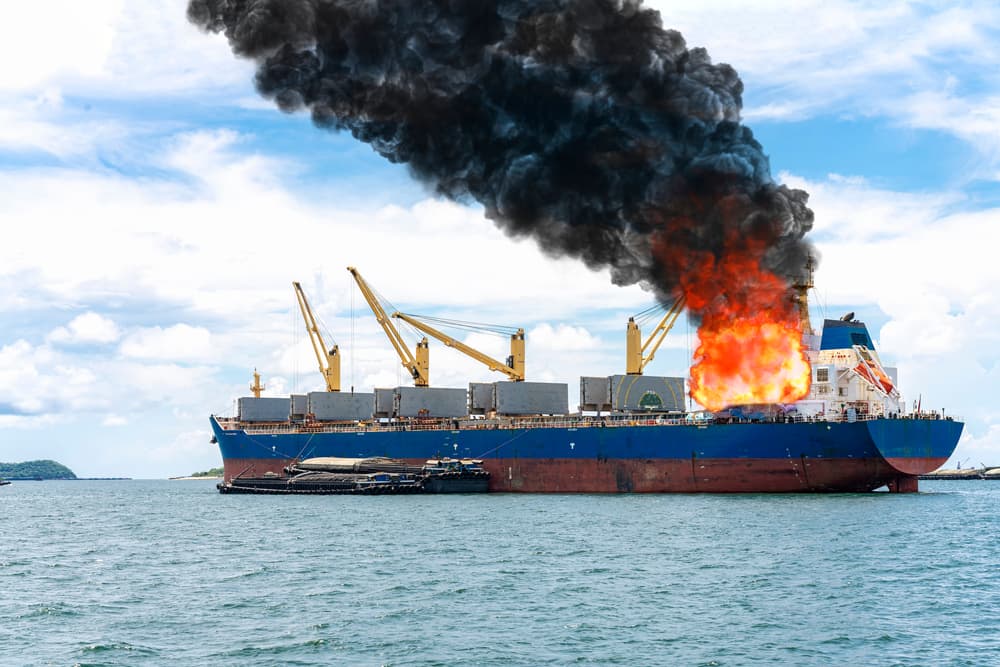Last Updated on December 3, 2024 by The Young Firm
Working offshore in Louisiana’s booming maritime industry can offer a rewarding career, but it doesn’t come without risks. The offshore environment is a dangerous workplace due to harsh weather, isolation, heavy machinery, and long working hours.
Whether stationed on an oil rig, a cargo ship, or a fishing vessel, your job exposes you to maritime hazards that can put your safety on the line.
If you’ve suffered an injury while working offshore, you may need the help of a maritime injury lawyer.
Here’s a look at some of the most common hazards workers face in Louisiana’s offshore industry. You’ll also learn why taking action against those responsible for your suffering can greatly improve your financial well-being.
Slips, Trips, and Falls: More Than Just an Inconvenience
It might sound simple, but slips, trips, and falls are among the most common causes of injuries in the maritime industry. Wet and uneven deck surfaces, tools left lying around, and sudden shifts in the ship’s movement make it easy for workers to lose their balance.
Falling on a moving vessel can cause severe injuries, from broken bones to traumatic brain injuries, which often require long-term recovery.
The limited access to medical care makes these accidents even more hazardous offshore. While most rigs and vessels have onboard medics, serious injuries often require transportation to the mainland, which can delay treatment and worsen the condition.
Slippery decks, narrow corridors, and sometimes unpredictable weather increase the likelihood of serious falls.
If unsafe conditions or your employer’s negligence injures you, a maritime injury attorney can seek the compensation you deserve.
Fire and Explosions: Sudden Catastrophes That Endanger Lives

Fire and explosions are some of the most terrifying hazards offshore workers face.
Oil rigs, drilling platforms, and cargo ships often store flammable materials, including crude oil, natural gas, and chemicals. A single spark, equipment failure, or electrical malfunction can trigger an explosion, leading to catastrophic results.
Injuries from fires and explosions can be life-threatening, including severe burns, respiratory damage from smoke inhalation, and tragic fatalities. Even with safety protocols, many offshore workers find themselves in harm’s way due to outdated equipment, insufficient training, or poor emergency preparedness.
Explosions, in particular, don’t just harm those closest to the blast site. The force of the explosion can throw workers overboard, trap them in confined spaces, or leave them stranded on a damaged vessel or rig.
You might face lasting physical and emotional trauma after such an incident, making it difficult to return to work anytime soon.
Heavy Machinery: A Source of Many Devastating Injuries
Machinery on offshore vessels and rigs is designed for heavy-duty operations. Cranes, winches, and other pieces of equipment are enormous, powerful, and sometimes dangerous if handled improperly. Equipment malfunctions, operator errors, and poor maintenance can all contribute to accidents.
Injuries from heavy machinery are often severe, ranging from crushed limbs to amputations.
Workers can get caught between moving parts, struck by machinery, or pinned beneath heavy objects. The weight and force of industrial equipment mean that even a small mistake can have devastating consequences.
These incidents often result in permanent disability or death, leaving families without a primary source of income.
Talk to a maritime injury lawyer about your options if you worked with defective or improperly maintained machinery.
Exposure to Hazardous Chemicals: Invisible Dangers
Offshore workers often handle or come into contact with hazardous chemicals used in oil drilling, cleaning, or even fuel storage. These substances can pose a serious health risk, especially when workers aren’t given the right protective equipment or training.
Prolonged exposure to these chemicals can cause chronic illnesses, respiratory issues, or even cancer.
A more immediate risk, however, comes from chemical spills. Workers are at risk of chemical burns, poisoning, and respiratory damage when a leak or spill occurs. Inhaling toxic fumes can endanger you in confined spaces with limited ventilation.
Handling hazardous materials requires strict adherence to safety protocols. Unfortunately, when companies cut corners or fail to provide proper protective equipment, workers pay the price with their health. After exposure to harmful substances, you might deal with long-term health complications. A maritime injury attorney can secure compensation for your medical expenses and future care.
Man Overboard: The Ocean’s Silent Threat
Falling overboard is a serious danger for those working in the offshore industry. Whether due to rough seas, slippery decks, or a lack of safety railings, a worker can suddenly find themselves overboard and struggling for survival in the open ocean.
Drowning is, of course, the biggest risk, but hypothermia, dehydration, and even shark attacks are real threats.
Retrieving a worker who has fallen overboard is not always straightforward. Rough seas, bad weather, or darkness can delay rescue efforts, and every minute counts.
Workers who survive the ordeal often suffer from psychological trauma in addition to physical injuries. Cold water shock and hypothermia can set in within minutes, reducing your ability to swim and making it difficult to stay afloat.
Employers must provide safety measures like life jackets and railings, but when they neglect them, you can find yourself in a life-or-death situation. If this happens, a maritime injury lawyer can hold your employer accountable for the unsafe conditions.
Fatigue: The Overlooked Risk Factor
Working offshore is physically and mentally demanding. Long shifts, sometimes lasting 12 hours or more, coupled with the isolation of being away from home for extended periods, can lead to extreme fatigue.
Fatigue dulls your reflexes, impairs decision-making, and increases the likelihood of accidents.
Exhausted workers are more prone to mistakes, whether mishandling equipment, failing to notice hazards, or falling asleep at the wrong moment. While fatigue might not seem like a direct hazard, it can cause or exacerbate many other risks, making it a dangerous factor in the offshore environment.
Accidents are almost inevitable when you’re constantly pushed to work long hours with insufficient rest. You shouldn’t have to endure dangerous working conditions because of employer negligence. If you suffered an injury due to exhaustion or overwork, a maritime injury attorney can explain your rights.
Confined Spaces: Breathing Difficulties and Explosions Waiting to Happen
Confined spaces like cargo holds, storage tanks, and engine rooms present their own set of hazards. These areas can quickly become dangerous due to a lack of ventilation, toxic gas buildup, or a lack of escape routes in the event of an emergency.
Workers who enter these spaces are often at risk of suffocation, poisoning, or getting trapped in the event of a fire or flood.
Confined spaces create risks without proper safety procedures. Workers must receive training to safely enter and exit these areas and have the right protective gear and monitoring equipment. Unfortunately, employers sometimes overlook these precautions, putting workers in harm’s way.
If you’ve been injured or trapped in a confined space while working offshore, a maritime injury lawyer can determine whether safety violations contributed to your accident.
Bad Weather and Rough Seas: Unpredictable and Deadly
The offshore industry doesn’t take a day off when the weather turns bad.
Louisiana is no stranger to hurricanes, tropical storms, and rough seas, all of which can cause major safety hazards for offshore workers. Bad weather can make equipment more difficult to handle, increase the chances of falling overboard, and lead to vessel instability.
A storm at sea can quickly turn into a life-threatening situation for workers on oil rigs or ships. Waves can capsize vessels, and strong winds can throw debris around, injuring workers. Lightning strikes are also a concern, especially on rigs with flammable materials.
While it’s impossible to control the weather, employers should have contingency plans and safety protocols to protect workers during severe weather events. If your employer failed to provide a safe environment during bad weather and you suffered an injury as a result, a maritime injury lawyer can pursue compensation.
Lifting and Carrying Heavy Loads: Physical Strain and Long-Term Injuries
Lifting and carrying heavy loads is part of the job for many offshore workers. Whether you’re hauling equipment, supplies, or cargo, the job’s physical demands can take a toll on your body.
Back injuries, hernias, and muscle strains are common, especially when workers aren’t trained in proper lifting techniques or given the right equipment to assist with heavy loads.
Repeated heavy lifting can lead to long-term injuries that prevent you from continuing to work in the offshore industry. Chronic pain, joint damage, and mobility issues can make it difficult to perform even basic tasks, leaving you with mounting medical bills and lost income.
When employers don’t provide proper lifting equipment or training, they put workers at risk of serious injury. If you’ve suffered a lifting-related injury, a maritime injury lawyer can help you seek compensation for your medical expenses and lost income.
Hydraulic System Failures: Dangerous Pressure at Work
Hydraulic systems are essential to many offshore operations, controlling everything from drilling equipment to winches and cranes. These systems operate under immense pressure, and the results can be disastrous when something goes wrong.
A sudden release of pressure can cause hydraulic fluid to spray out, leading to burns, blindness, or even amputation if a worker is caught in the machinery.
Improper maintenance, faulty parts, or operator error often cause hydraulic failures. If a hydraulic system failure has injured you, you may have grounds for a claim, especially if safety protocols were ignored or the system was improperly maintained.
A maritime injury lawyer can build a case to hold your employer accountable for hydraulic system failures and the injuries they cause.
How a Maritime Injury Lawyer Will Investigate to Determine Blame for Your Injury
When you’re injured in a maritime accident, figuring out who’s responsible isn’t always clear-cut. A maritime injury lawyer will take several steps to get to the bottom of the incident, ensuring you get the compensation you deserve.
Interviewing Witnesses
One of the first things your attorney will do is interview everyone present when the injury occurred.
Co-workers, supervisors, and even third parties can provide valuable information about what happened. These witness statements help establish the timeline of events and whether anyone neglected safety protocols. Your lawyer will dig deep to uncover details that others might overlook.
Reviewing Safety Protocols
Maritime work comes with strict safety guidelines that employers must follow. Your lawyer will investigate whether your employer adhered to these rules.
Were safety drills conducted regularly? Were workers properly trained? Did the equipment meet safety standards?
If your employer ignored safety regulations, your lawyer will use that as evidence to hold the responsible party accountable.
Examining Maintenance Logs
In many cases, faulty or poorly maintained equipment plays a role in maritime injuries. Your lawyer will request access to maintenance logs for any machinery or equipment involved in the accident.
By reviewing these records, your lawyer can determine if the equipment was regularly inspected and maintained or if negligence contributed to your injury.
Gathering Medical Records
Your medical records are important in proving the severity of your injury. A maritime injury lawyer will gather all your medical documents, including any treatments you received immediately after the accident and ongoing care.
This information can help assess your condition and forecast any long-term effects, ensuring your compensation covers future medical expenses.
Collaborating With Experts

Your lawyer may bring in maritime safety engineering or medical experts to strengthen your case. These professionals can offer insights into the accident, whether your employer breached safety measures, and how your injury will impact your life.
By combining their findings with the other evidence, your lawyer will build a solid case for who’s at fault.
Through careful investigation, your maritime injury lawyer will leave no stone unturned to determine who’s responsible for your injury.
Contact a Skilled Maritime Injury Lawyer to Protect Your Rights
If you suffered an injury while working in the maritime industry, take the necessary steps to protect your rights. A maritime injury attorney can use their skills and knowledge to pursue the compensation you deserve for your injuries. Contact an attorney immediately for your free case review.

